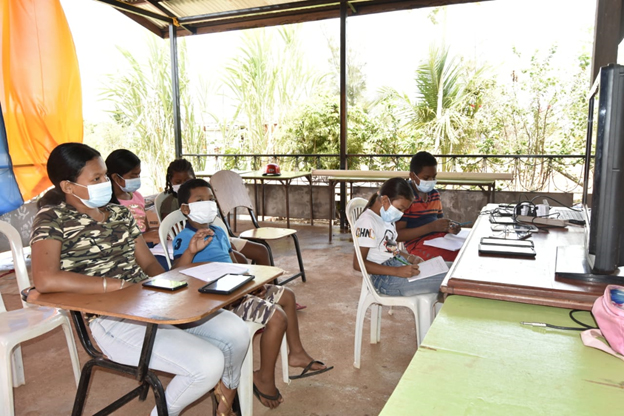Can educational outcomes for vulnerable children be enhanced through an integrated approach to curriculum? STEMGuyana and partners are willing to try.
This year’s UNICEF report on school closures notes that fourteen countries worldwide have remained largely closed since March 2020 to February 2021. Two-thirds of those countries are in Latin America and the Caribbean; overall, nearly ninety-eight (98) million schoolchildren. Guyana is listed among the affected countries.
The most vulnerable children, not least, those who have been unable to secure access to remote learning are at significantly greater risk of never returning to the classroom. Some of them (who knows?) could be forced into child marriage or child labour. Frankly, the challenge involved in preventing this eventuality may well take ‘a miracle’. Needless to say, the impact of this on the social growth and economic development of these affected countries, including Guyana, can be both long-term and devastating.
UNICEF’s Executive Director Henrietta Fore puts the challenge into perspective, asserting that, “as we approach the one-year mark of the COVID-19 pandemic, we are again reminded of the catastrophic education emergency worldwide lockdowns have created. With every day that goes by, children unable to access in-person schooling fall further and further behind, with the most marginalized paying the heaviest price.”
Even as we lament the current school closures, however, there is need for us to acknowledge that, across the globe, traditional education has not, in large numbers of instances, served vulnerable children well. In the United States, for example, billions of dollars have been spent in what we are told has been an effort to close the achievement gap between black and white students. According to the Mckinsey Research Group, “despite the enormous attention devoted to the achievement gap, it has remained a stubborn feature of the US education system. In 2009, we estimated that the gap between white students and black and Hispanic ones deprived the US economy of US$310 billion to US$525 billion a year in productivity, equivalent to 2 to 4 per cent of GDP.” The achievement gap between high- and low-income students was even greater, reportedly depriving the country’s economy of US$400 billion to US$670 billion or 3 to 5 per cent of GDP. Needless to say there are also huge social costs to these failures.
Answering the call to help improve educational outcomes for vulnerable students, STEMGuyana, along with its partners, Tullow Oil, ExxonMobil, the Department of Youth, and the Guyana diaspora, launched a programme, rolling out twenty-one ‘Learning Pods’ in nine of the country’s administrative regions. The objective was to create a cost effective after-school educational delivery model aimed at improving the performance outcomes of vulnerable children. The programme has secured funding for four months, however, it is intended to be a longitudinal study which can be expanded across the country.
Execution of the programme is managed by a mobile and web app which organises the nearly 1,000 Lessons Plans that have been created by STEM Guyana’s team of eight interns.
“Some of the challenges we’ve encountered in rolling out the project include poor Internet connectivity at some pod sites, technical problems with internet hotspot devices deployed at some areas and under-budgeting,” STEMGuyana co-founder Ima Christian has told the Stabroek Business. “In some instances, having not budgeted for snacks we have had to scramble at the last minute to raise additional funds. We have also had challenges associated with malfunctioning hardware and software. We have, however, been determined to overcome these challenges and we are happy to report that most of those are now under control.”
STEMGuyana Executive Director, Karen Abrams, told Stabroek Business that what the organisation has been seeking to do with its Learning Pods is to engage those vulnerable children with a technology-based academic curriculum which embraces the core subjects, Mathematics, English and Science. “Essentially, we’re designing, testing, and iterating an approach which means that we implement, monitor, measure, and make changes. We keep what works and we discard what doesn’t work. We do not assume that we have the answers to all of the problems of education and we definitely consider ourselves as being in partnership with parents and with the Ministry of Education.”
The Learning Pods programme runs for two sessions every Friday and Saturday and the programme’s technical support personnel are ‘on call’ while a central teacher remains on Zoom to deliver the more difficult lessons. “We believe that we have created an engaging and effective model and intend to expand our programme across the country and possibly even across the region,” Abrams says.
Contact can be made with us at stemguyana@gmail.com for more information.








